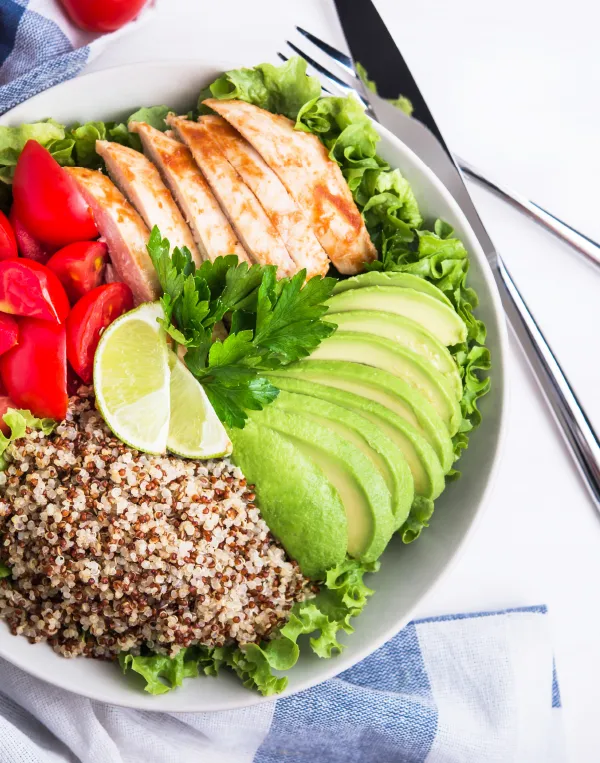Looking for a team of practitioners that can unravel the causes of PCOS and provide natural solutions to your PCOS symptoms?
How Nutrition, Lifestyle and Functional Medicine can help with PCOS
Let’s start with a brief introduction to PCOS and how it is officially diagnosed.
Polycystic Ovary Syndrome, or PCOS, is a complex hormonal & metabolic imbalance with a genetic component.
Approximately 5 – 10% of women of reproductive age are affected by PCOS globally.
Using the Rotterdam Criteria, a diagnosis of PCOS will be made when a woman experiences any two of the following three concerns:
- Infrequent or no ovulation.
- Clinical signs or biochemical indications (blood tests) of high levels of male hormones (androgens).
- Polycystic ovaries as seen on an ultrasound scan.
Whilst there is no cure and you may always be prone to PCOS, so much can be done to manage the condition, regulate hormones and reverse symptoms.


There is a different way of living
What you may have to accept is that there is a different way of living that is required to help you manage PCOS so that the symptoms and challenges you currently experience are no longer a concern.
Whilst there is unlikely to be one exact cause for PCOS, what we do know is that there are a few important areas to consider and target:
- Insulin Resistance – Our cells become less responsive to the effects of insulin; a hormone produced to regulate our blood sugar. As a result, insulin levels can become chronically elevated and/or you may get insulin surges after meals.
- High Androgens – classically regarded as male hormones, females do also have the same hormones but just at lower levels. In PCOS some androgens may increase, and this causes numerous symptoms.
- Inflammation – Often low-grade inflammation is a factor in PCOS. It may contribute to insulin resistance and inflammation may also be the result of insulin resistance and weight gain, creating a vicious cycle.
We are here to support your PCOS journey
What are the typical PCOS symptoms?
Polycystic ovary syndrome (PCOS) leads to an imbalance in female reproductive hormones. This imbalance disrupts the regular release of eggs from the ovaries (ovulation). Without consistent ovulation, the menstrual cycle becomes irregular or may stop entirely. Additionally, increased levels of androgens, or male hormones, common in PCOS, can interfere with the menstrual cycle. This hormonal imbalance can result in irregular or absent periods.
Polycystic ovary syndrome (PCOS) is associated with elevated levels of androgens, which are often referred to as male hormones. One of the common androgens is testosterone. When androgen levels are high in females, it can stimulate excessive hair growth, especially in areas where men typically grow hair, such as the face, chest, and back. This condition is known as hirsutism. The increased androgen production in PCOS is the primary cause of the hirsutism seen in many women with the condition.
Polycystic ovary syndrome (PCOS) is linked to elevated levels of androgens, or male hormones. High androgen levels can lead to hair thinning on the scalp, a condition called androgenic alopecia. This is the same pattern of hair loss that affects many men as they age. In women with PCOS, the increased androgen levels can shift the hair growth cycle, leading to reduced hair thickness and growth on the scalp while promoting hair growth in other areas, like the face and body.
Polycystic ovary syndrome (PCOS) often leads to insulin resistance, where the body's cells don't respond well to insulin. As a result, the body produces more insulin to compensate. Elevated insulin levels can promote fat storage, especially in the midsection. Additionally, high insulin can increase the production of androgens in the ovaries, which can further contribute to weight gain. The combination of hormonal imbalances and insulin resistance in PCOS makes it easier to gain weight and harder to lose it, particularly around the abdomen.
Polycystic ovary syndrome (PCOS) is often linked with insulin resistance, where the body's cells don't efficiently use insulin. This leads to elevated insulin levels in the bloodstream. High insulin can hinder fat breakdown and promote fat storage, making weight loss more challenging. Additionally, hormonal imbalances associated with PCOS can slow metabolism and increase appetite, further contributing to weight loss resistance. As a result, women with PCOS often find it more difficult to lose weight compared to those without the condition.
Polycystic ovary syndrome (PCOS) leads to increased production of androgens, or male hormones, in the ovaries. Elevated androgen levels stimulate the sebaceous glands to produce more sebum, an oily substance in the skin. Excess sebum, along with dead skin cells, can clog hair follicles, leading to acne breakouts. The heightened androgen levels in women with PCOS are a primary reason for the increased prevalence of acne in these individuals.
Polycystic ovary syndrome (PCOS) results in hormonal imbalances, including fluctuations in estrogen, progesterone, and elevated androgens. These hormonal changes can directly impact mood and emotional well-being. Additionally, the physical symptoms and challenges associated with PCOS, such as infertility, weight gain, and skin issues, can contribute to emotional distress, anxiety, and depression. The combined effect of hormonal shifts and the psychological stressors related to the condition can lead to mood changes in individuals with PCOS.
Polycystic ovary syndrome (PCOS) leads to hormonal imbalances that disrupt regular ovulation, making it difficult for women to conceive. Without consistent ovulation, the chances of an egg being released and fertilized diminish. Additionally, the hormonal imbalances can result in a less favourable uterine environment. This might affect the quality of the endometrial lining, making it harder for a fertilised egg to implant. Moreover, women with PCOS often have higher insulin levels, which can adversely affect egg quality, increasing the risk of miscarriage if conception does occur.
The imbalance of reproductive hormones can hinder the maturation and release of eggs during the ovulation process. Instead of being released, these immature follicles (tiny sacs where eggs develop) can accumulate in the ovaries. Over time, these follicles can fill with fluid, forming cyst-like structures. While the term "polycystic" suggests multiple cysts, these are, in fact, numerous immature follicles that have not successfully ovulated. This accumulation is why ovaries in women with PCOS often contain multiple small "cysts."
Conventional treatments for PCOS
The most common treatments recommended to those with PCOS are metformin, oral contraceptive pills and drugs that suppress androgens.
Interestingly, oral contraceptives can induce PCOS once stopped. Their role is to suppress the production of androgen hormones that create some of the symptoms of PCOS, however the moment the oral contraception is stopped, the hormones surge once again. A secondary point with oral contraceptive medications is that they can lead to insufficiencies in certain nutrients, which are essential for ovulation.
Metformin helps to improve insulin sensitivity and is the most common medication used to manage type 2 diabetes. Management of insulin is a very effective way of managing PCOS as insulin can stimulate androgens and promote the growth of cysts.
Androgen suppressing medications are something that treats the symptoms of high androgens and does nothing to address the underlying causes.
Many people are looking for natural ways to restore balance and address the underlying issues that contribute to PCOS.


How we help you manage PCOS naturally
Our nutrition, lifestyle, and functional medicine approach can help you manage PCOS as naturally as possible.
Here are some of the ways that we support that process:
Appropriate Testing
Looking beyond the basic tests carried out by your GP, we can determine in more detail the level of insulin resistance and the hormonal imbalances that may be contributing to PCOS and subsequent symptoms. We can explore nutrient insufficiencies, inflammation levels and even explore how other systems in the body might be impacting on the development of PCOS.
With the data that we gather, alongside a detailed health history, symptom analysis and nutrition and lifestyle review, we can then determine the best course of action for you to take.
Nutrition and lifestyle interventions
Nutrition and lifestyle modifications are at the heart of managing PCOS naturally. Whilst your gene’s might load the gun for PCOS, our nutrition and lifestyle pull the trigger.
We work with you to formulate personalised nutrition and lifestyle recommendations that are both realistic and effective.
Areas we might focus on as part of your nutrition and lifestyle interventions are:
Optimising Dietary Habits
Dietary changes to improve blood sugar management, improve insulin sensitivity, support healthy body composition, and lower inflammation.
Reducing Inflammation
Addressing underlying causes of inflammation such as diet, excessive body fat, immune, microbiome and other factors that promote inflammation.
Targeted Supplements
Using lab tests to guide your specific supplement needs to help with the underlying causes of PCOS and the associated symptoms.
Exercise Strategies
Helping you develop appropriate exercise strategies specific to those with PCOS and those challenged with weight loss resistance.
Limiting Endocrine Disrupting Chemicals
Minimising exposure to chemicals we find in products, food supply and our environment to help support healthy hormone balance.
Optimising Sleep Health
Good sleep can improve insulin sensitivity, lower inflammation, and also have a significant impact on the nutrition and lifestyle choices made.
Healthy Microbiome
Our gut health can be an important consideration for low grade inflammation and also glucose metabolism, thus impacting PCOS.
Stress Management
Lowering stress can help with hormone balance. It also helps us manage our nutrition and lifestyle choices that may be negatively impacting PCOS.
We are here to support your PCOS journey
Learn More About What Our Clients Have to Say

Sarada
Now, after having worked with Jane, I have all the tools necessary to continue managing my condition (PCOS) powerfully. I have a much better understanding of how my body works, and how to deal with any issues that may arise.
Before I came to work with Jane at Steve Grant Health,...

Sarada
Now, after having worked with Jane, I have all the tools necessary to continue managing my condition (PCOS) powerfully. I have a much better understanding of how my body works, and how to deal with any issues that may arise.
Before I came to work with Jane at Steve Grant Health, I had really been struggling to manage my PCOS symptoms. It felt like I was constantly experimenting and never quite finding the right solution.
After reading about what Jane offered, I felt that she would be a great fit for me and what I’ve been dealing with, and I was pleased to discover that I was right!
What I valued most about Jane’s approach was that she listened and was thorough in learning all about my condition, and anything else that was going on for me. She provided me with a comprehensive program of nutrition, movement and supplementation, and as I continued working with her, I could see that some of the more difficult aspects of my condition began to subside. And even when I had an unexpected injury, that could have derailed my progress, Jane was always there to provide much needed support and advice.
Now, after having worked with Jane, I have all the tools necessary to continue managing my condition powerfully. I have a much better understanding of how my body works, and how to deal with any issues that may arise.
Thank you so much for making such a difference to my health and wellbeing!

Georgina
I came to Steve Grant Health about a year ago on a friend’s recommendation after being diagnosed with PCOS. It completely floored me as I had just got engaged and was looking forward to starting a family, all I associated PCOS with was infertility.
Following the initial diagnosis in April 2014...

Georgina
I came to Steve Grant Health about a year ago on a friend’s recommendation after being diagnosed with PCOS. It completely floored me as I had just got engaged and was looking forward to starting a family, all I associated PCOS with was infertility.
Following the initial diagnosis in April 2014 I had been placed on medication to help me ovulate including meformin and Clomid. Neither seemed to be successful and by the time I saw you I had only had one period in a year.
When we had our consultation I was reassured by how much you had read about my circumstances before, including analysing blood test results. The plan you gave me was realistic and sustainable for my lifestyle and you also recommended a supplement that had very recently been researched. I was amazed at your knowledge given that most professionals I’ve dealt with know very little about PCOS.
Within a month of following your plan (admittably with a few more wines than suggested) and taking the supplement I had a natural period, a month later I became pregnant which unfortunately ended in miscarriage but gave me the confidence that my body was working. One natural period later I was pregnant again just after our wedding and we’ve now just welcomed a much wanted daughter.
I can’t thank you enough for everything you have done, I genuinely don’t think our daughter would be here if it weren’t for our consultation. In addition, taking control of my nutrition finally made me feel empowered over my body when I was beginning to feel so lost.
You are doing an amazing job and thank you from bottom of my heart.
Georgina (and baby Ruby)

Susie
A friend recommended I meet with Steve Grant when I was diagnosed with PCOS. After further investigations into my PCOS at various hospitals, I was told I had to undergo surgery to remove a pseudopapillary tumour from my pancreas, which was found during these investigations. This was by far the...

Susie
A friend recommended I meet with Steve Grant when I was diagnosed with PCOS. After further investigations into my PCOS at various hospitals, I was told I had to undergo surgery to remove a pseudopapillary tumour from my pancreas, which was found during these investigations. This was by far the most physically and mentally challenging periods in my life; my body, which was far from strong, had to undergo major surgery and endure a hard road to recovery. However, without a doubt Steve played an instrumental part in my full recovery and our work together achieved my first natural period in over 10 years. It felt like a miracle and was a huge achievement for me. Since then, my periods have been regular and the side affects of having PCOS stopped – all because of Steve and his tremendous knowledge and work.
Steve is truly remarkable. His understanding of the human body and how it correlates with and responds to what we consume is outstanding. I owe a great deal to him for his dedication and commitment in seeing me achieve optimum health. I will absolutely continue to see Steve in my future; I’ve been lucky enough to find someone who genuinely cares for his clients whilst having a profound wealth of knowledge.
You really can turn your health around, with the right information and the right mind-set. Thank you Steve.
Emanuela N
I’ve been working with Jane for 1.5yrs and I’ve reached truly amazing results. I was severely underweight, training excessively, fighting IBS + PCOS and in a bad place mentally – all whilst trying to regain my long-lost period. Steve Grant Health came recommended from a friend but I didn’t quite know...
Emanuela N
I’ve been working with Jane for 1.5yrs and I’ve reached truly amazing results. I was severely underweight, training excessively, fighting IBS + PCOS and in a bad place mentally – all whilst trying to regain my long-lost period. Steve Grant Health came recommended from a friend but I didn’t quite know what to expect.
After submitting an online questionnaire, I was assigned to Jane and I still vividely remember my first appointment with her. We talked and talked about everything that was going on in my life and how I had reached the point I was at. We started devising a plan for my recovery and we met monthly for a while to track progress. I was very worried about putting on weight and I had so many ups and downs, but Jane has not been just a nutritionist for me – she basically held my hand the whole way and helped me see and embrace a whole new way of living, eating, managing stress, and enjoying food and exercise in a much more balanced way.
Jane has a very compassionate holistic approach, which helps a lot, and you can really talk to her about anything that’s on your mind. The SECA machine they use it’s also very useful to have realtime data about your body composition and they have recipes of all sorts that meet you right where you are.
With Jane, I not only regained my period, but I’ve also learnt both how to keep my IBS (haven’t had a flare-up in many many months!) and PCOS at bay. Having done some separate blood tests, I’ve also had the scientific proof that my hormones are in a much healthier state.
Shout-out to Fay too, who makes the bookings and general admin so quick and easy. It is truly such a welcoming place and you feel safer the moment you walk in, I can’t recommend it enough.

Stay in touch
Subscribe to our newsletter and receive your FREE seasonal recipe ebook




